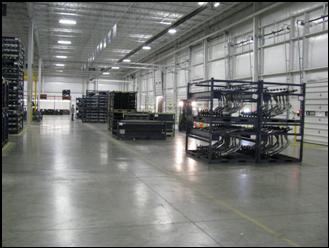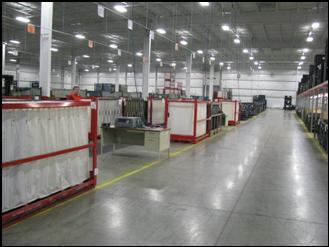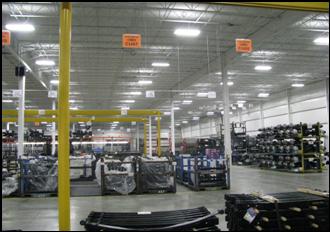Comprehensive Logistics – Great Skills, Tough Year
Youngstown, Ohio USA
February 3, 2009
By
Richard Armstrong
Key Personnel:
Don Constantini – Chairman & CEO
Brad Constantini – Executive Vice President
Brian Hume – Sr. Vice President & General Manager
Keith Blazaitis – General Manager, Automotive Group
Hollis Van Bockern – Executive Director, Business Development
Greg Bousquet – Director, Sales, Marketing & Real Estate
Bob Dunn – General Manager, Consumer Products Division
Trey Lyda – Director, Corporate AQP
Comprehensive Logistics Inc. (CLI) is a top notch automotive logistics third-party logistics provider (3PL). It is one of the four lead logistics providers (LLPs) for General Motors and a major provider for Ford and other original equipment manufacturers (OEMs). It just launched a new operation at Ford’s Avon Lake, OH assembly plant.
For Ford at Avon Lake, CLI will perform a series of operations supporting the manufacturing assembly line. These activities are inbound receiving, sequencing, bulk and racked warehousing and small lot materials management, kitting/subassembly and quality inspection, plus just-in-time (JIT) transportation services.
The new Ford operation is similar to operations that CLI has for GM’s assembly plants in Lordstown and Toledo, OH; Baltimore, MD; plus Delphi Corporation and 14 other locations for GM and Tier 1 suppliers.



 CLI’s operations fall into four key areas. First, there are the Logistics Optimization Centers (LOCs) near the Ford and GM assembly plants. These locations manage inbound materials, sequencing¹ and kitting of components, value-added subassembly² and outbound shuttles. Included in these activities is the management of inbound and outbound containers. Kitting³/subassembly components include: headliners, door panels, exterior fascia, electrical systems, rear axles, chassis components and dozens of other parts.
CLI’s operations fall into four key areas. First, there are the Logistics Optimization Centers (LOCs) near the Ford and GM assembly plants. These locations manage inbound materials, sequencing¹ and kitting of components, value-added subassembly² and outbound shuttles. Included in these activities is the management of inbound and outbound containers. Kitting³/subassembly components include: headliners, door panels, exterior fascia, electrical systems, rear axles, chassis components and dozens of other parts.
The second operational area is transportation management. Using its “ProFR8” transportation management software, CLI works as a transportation LLP. With ProFR8, CLI provides network and route optimization plus manages over 500 carriers. ProFR8 covers carrier management and execution functions while providing real time track and trace. CLI also handles expedited shipments using ProFR8 as the tool. Approximately 65,000 loads are handled through CLI’s Load Control Center each year.
The third component is an interesting value-added warehousing operation that CLI calls “Strategic Protection Warehousing”. The main purpose of these locations is to ensure uninterrupted supply of key components into customers’ manufacturing locations. Inventory is also maintained for bankruptcies, tool moves and other potential supply chain disruptions. These operations are strategically developed with CLI’s customers throughout North America to meet their short and long-term inventory, parts and materials storage and value-added requirements. CLI manages over three million square feet of space and leverages its flexible short-term real estate capabilities. Warehousing, repack, kitting, sorting, rework, inspection, and vendor managed inventory (VMI) are daily activities that are performed simultaneously for multiple customer requirements.
The fourth key operational area is related to materials management functions. CLI manages the material flow for 10 stamping plants. CLI customizes its contract staffing to meet customers’ needs, including documented training procedures based on customer requirements complete with cross training and back fill plans. CLI has the ability to add experienced support staff during crisis situations and provide 24/7 material updates. It has the ability to streamline the information flow from individual customer locations while compiling it in a straight forward manner to provide management overview. In addition, CLI provides 24/7 transportation management for all transportation modes for these plants through ProFR8. Transportation management covers all inbound, milk runs, outbound truck and rail shipments. Expedited shipments are handled on a regular basis. There are on-site managers for transportation and materials management 24/7 at all 10 locations to handle two-hour delivery windows. Additional support is provided by Falcon Transport’s fleet.
CLI’s sister company, Falcon Transport, is an asset based carrier heavily involved in the Automotive and Steel industries and is rapidly expanding into the Consumer Packaged Goods (CPG) and Industrial industries. Falcon is a core carrier for companies such as: ArcelorMittal, Ford, GM and U. S. Steel. It has 989 tractors and 1,394 trailers.
As a customs trade partnership against terrorist (C-TPAT) certified company, CLI prepares export shipments, packaging, order management and shipment tendering services. All operations are ANSI/ISO/ASQ Q9001-2008; and LOC operations are ISO/TS 16949-2002 certified.
The scale of CLI’s LOCs can be measured in a few statistics. From the 11 LOC metering operations, 88,000 containers are normally picked per week and 71,000 lifts are shipped. There are 5,200 unique part numbers. Comprehensive averages over 300 JIT deliveries a day to support automotive assembly operations.
CLI also sequences 122 different commodities and 700,000 parts per week. It builds 15 subassembly modules with 2,200 unique parts and makes 240 direct deliveries per day.
To control and continually improve all of its complex operations, CLI uses a Deming style quality process. Process change is initiated with a “Change Management Request” (CMR). The process then proceeds step by step. This continuous improvement model is a core feature of CLI’s corporate culture.

The CLI organization bases its entire operation and organization on this continuous improvement process (CIP). CLI is effective is its disciplined application and carry through of the CIP in all facets of its business.
The CLI and Falcon group has roots dating back to J.V. McNicholas who started a transport company in Youngstown, OH in 1906. CLI commenced operations in 1995. The combined companies have grown to over $265 million in annual revenues of which CLI contributes 25–30%.
A major challenge for CLI over the next year is to adapt its advanced skill set to a changed market place. Its major customers, GM, Ford and Chrysler, have been hit hard by the recession and the demand for more fuel efficient cars. In addition to the Automotive sector, CLI is focusing on developing business in the Consumer Products, Consumer Durables, Industrial and Retail verticals.
Brian Hume, senior vice president and general manager, is moving quickly to develop other vertical industry opportunities. To that end, he has added Bob Dunn to head the Consumer Products Division and Hollis Van Bockern as executive director for business development. Both Dunn and Van Bockern have extensive third-party logistics backgrounds. Their contacts and expertise in the CPG, Consumer Durables, Industrial, and Retail verticals will help CLI successfully adapt and deliver cost/service effective supply chain and value-added solutions to their customers.
______________
¹Sequencing in the Automotive industry is the process of delivering automotive parts to an assembly plant in the exact order or sequence as the vehicles that require them are coming down the production line. This sequence is most often defined by the paint shop process. A unique broadcast message is transmitted to the automotive supply vendors which identify the sequence and relevant components or each vehicle as they exit the paint shop. This could be real time (e.g., GM, Ford and Chrysler) or pre-determined (e.g., Ford – ILVS). CLI then provides the necessary part placed in proper order onto specialized racks or conveyors. The true challenges in this business arrangement lie in the ability to be reliable. Dealing with high volumes and small windows leaves no room for error. All processes and systems must be robust and have viable alternatives in the event of any part of the process failing. To accomplish this task, the right technology and team supporting this process is considered to be “Mission Critical”. Parts must be delivered on time and in the correct sequence 100% of the time. Automotive sequencing truly brings the concept of JIT deliveries to a new level; and consequently, any system that properly supports this model must also re-define reliability, robustness, and have the required redundancy.
²Subassembly is the process of building up parts with the correct option and part content and delivering the parts to an assembly plant with all of the same processes included in sequencing. The relevant components for each vehicle are identified either by a finished part number or a part number with many option codes. CLI then sub assembles the necessary part using many levels of electronic verification devices (called proofing) and places the subassembly in proper order onto specialized racks or conveyors.
³Kitting is the process of placing two or more items (usually many) into a grouped item shipped as a single item from the inventory file. Inventory files are updated upon the shipping of the kitted item by deducting each of the sub-components in the kit and crediting the kitted item. CLI’s preferred electronic verification system is a Vision system integrated with radio frequency identification (RFID) tags for tracking. A digital image of the kit is stored in CLI’s systems for future reference, if required.


